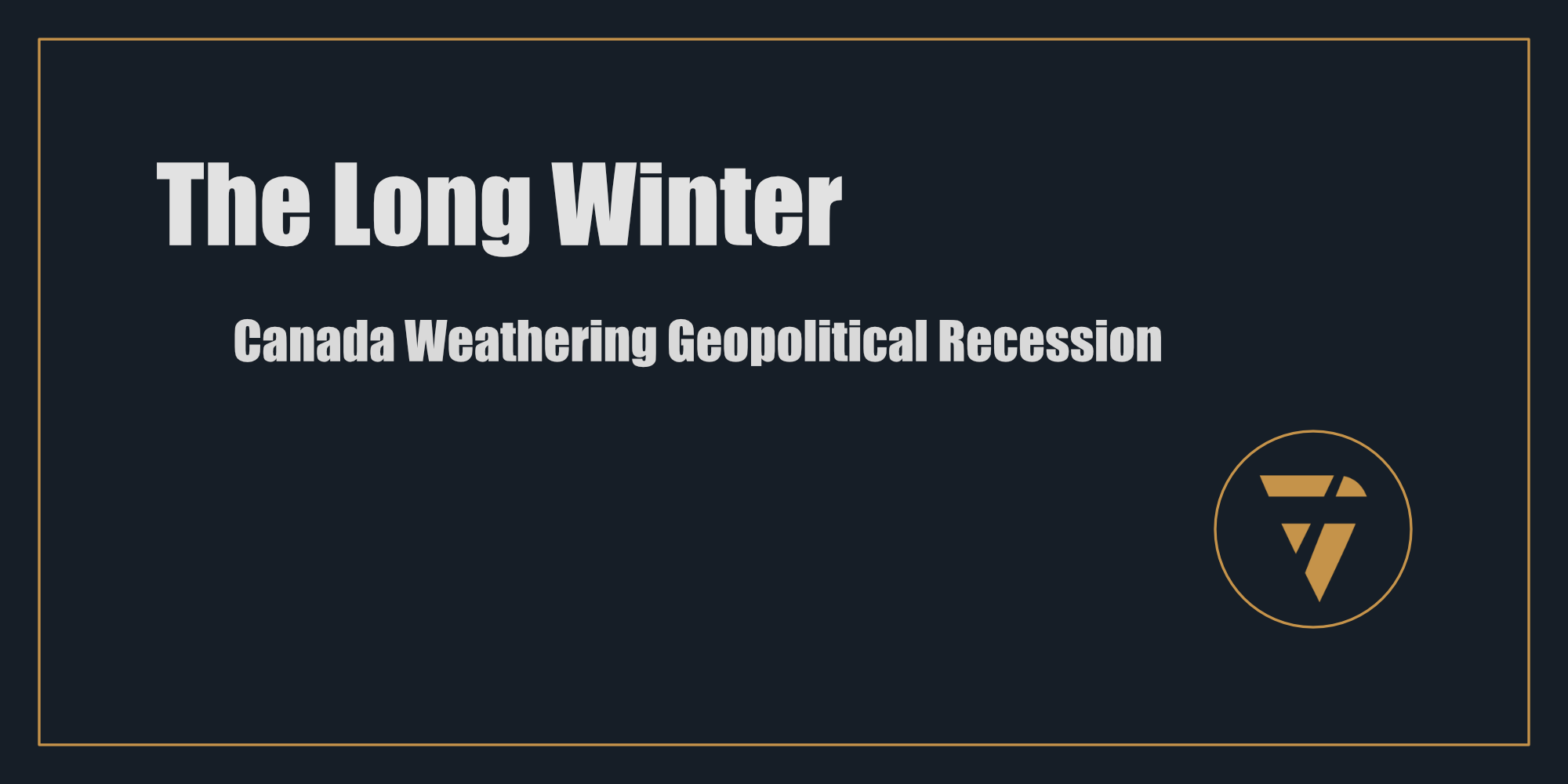The Long Winter
Canada Weathering Geopolitical Recession

What if this isn’t just a storm, but the beginning of a long winter?
The world is unraveling—not in a dramatic, headline-grabbing collapse, but in the slow, grinding erosion of the systems we thought were unshakable. This isn’t an economic recession where markets dip, recover, and life carries on. This is a geopolitical recession—a shift so profound that it challenges the foundations of global order.
Canada, nestled between a disintegrating superpower and a fractured international stage, faces an unprecedented challenge. How do we weather this long winter? And more importantly, how do we prepare for the spring that will inevitably follow?
The Geopolitical Recession: A Different Kind of Decline
Unlike economic recessions, which come and go in predictable cycles, a geopolitical recession marks the decline of global systems:
- Trade Decoupling: Nations turn inward, severing once-interconnected supply chains.
- Power Shifts: Emerging economies challenge traditional powers.
- Resource Conflicts: Water, energy, and critical minerals become battlegrounds.
- Erosion of Trust: Multi-lateral institutions falter, and alliances fracture under the weight of conflicting priorities.
This isn’t a storm to ride out, it’s a fundamental re-ordering of how the world works. And it will last far longer than most are prepared to admit.
Canada’s Role in the Long Winter
Canada stands at a crossroads. As the United States stumbles under internal division and external pressures, its long-standing role as a stabilizing global force is collapsing. For Canada, this presents both risk and opportunity:
Risk:
Over-dependence on U.S. trade and security leaves Canada vulnerable to its neighbour’s instability.
A resource-heavy economy faces challenges in a world that increasingly values sustainability and innovation.
Internal divisions—East vs. West, urban vs. rural, settler vs. Indigenous—threaten cohesion.
Opportunity:
Canada’s political stability and reputation for fairness make it a potential bridge-builder in a fractured world.
Vast natural resources position the country as a leader in energy transitions and critical minerals.
A diversified economy and multicultural society offer resilience in the face of global uncertainty.
Canada is not a superpower. But in a world where trust is crumbling, its position as a middle power with moral credibility gives it a unique advantage.
Surviving the Winter: Strategies for Resilience
To weather this long winter, Canada—and its leaders—must adopt a mindset of resilience and long-term adaptation. Here’s how:
1. Diversify Alliances and Supply Chains
- Pivot from U.S.-centric trade to stronger ties with the EU, ASEAN, and Africa.
- Build resilient supply chains that reduce dependence on volatile regions.
- Look North.
2. Invest in Domestic Strengths
- Double down on sustainable energy, leveraging Canada’s natural resources.
- Build domestic manufacturing to insulate against global supply chain disruptions.
- Strengthen social cohesion through policies that prioritize equity and inclusion.
3. Innovate for the Future
- Lead in sustainable technologies, from carbon capture to smart agriculture.
- Support R&D that positions Canada as a hub for AI, clean tech, and advanced manufacturing.
- Net-Zero Compute.
4. Embrace Leadership on the Global Stage
- Act as a mediator in international disputes, leveraging Canada’s reputation for neutrality.
- Push for reforms in multi-lateral institutions, advocating for fairness and sustainability.
Preparing for the Spring
History shows us that no winter lasts forever. When the geopolitical recession finally gives way to recovery, the nations that prepared will lead the new order. Canada must not only survive, but position itself to thrive in the world to come.
Key Steps for Renewal:
- Build partnerships with emerging powers to secure long-term growth.
- Transition the economy from resource extraction to value-added industries.
- Amplify Canada’s global brand as a leader in ethics, innovation, and environmental stewardship.
The spring will not resemble the past—it will be a new landscape, shaped by the choices we make today.
What’s Next?
Canada’s future will be defined not by its ability to endure, but by its willingness to lead. The geopolitical recession offers a rare chance to rewrite the rules, to build a more resilient, fair, and innovative nation.
- What alliances should Canada prioritize in this fractured world?
- How can businesses and policymakers prepare for the coming shifts?
These are the questions that will define the next decade.
Your Turn
- Subscribe for insights on navigating the geopolitical recession.
- Join the Conversation: Share your thoughts—how do you see Canada’s role in this shifting world?
- Act Today: Whether you’re a business leader, policymaker, or citizen, the time to plan for the future is now.
The long winter is here. Let’s ensure Canada emerges stronger, ready to lead in the spring that follows.
The world is shifting. We know the cold. Settle in.
This Substack is reader-supported. To receive new posts and support my work, consider becoming a free or paid subscriber.
This is what I’m working on. Tell me what you think, I enjoy the conversation! Subscribe and follow the work in real time.
Thanks!
B
This isn’t just an economic downturn, it’s the deliberate unraveling of global order. As alliances fracture and power shifts, Canada stands at a crossroads. Will we lead through the chaos, or be swept away?
The future belongs to those who prepare now.
PS -





